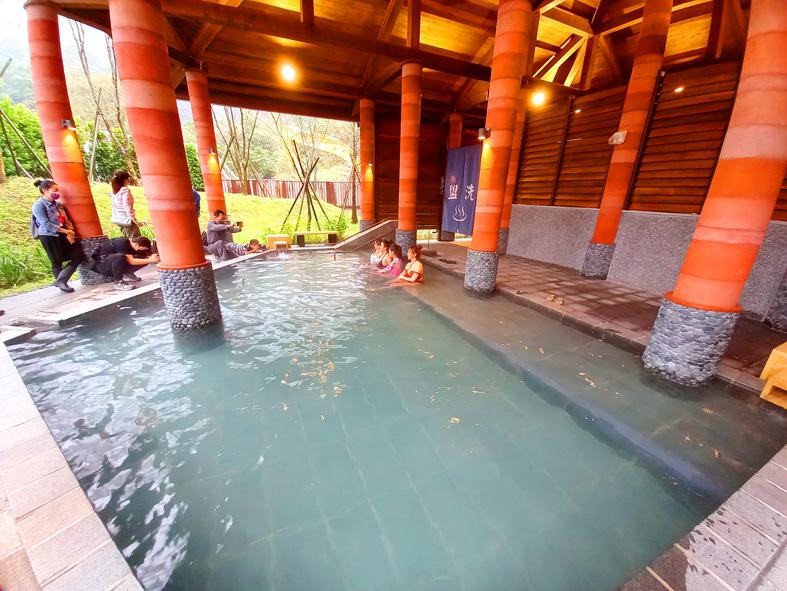People with cardiovascular disease or any of the “three highs” — high blood pressure, high blood lipids or high blood sugar — should be careful when enjoying a hot spring or hot bath in low temperatures, the Health Promotion Administration (HPA) said.
As temperatures dropped yesterday, many people might want to go to a hot spring to warm themselves and relax, but those with cardiovascular disease should consult a doctor first, the HPA said on Saturday, offering six tips for people, especially those with cardiovascular disease or the three highs, to bear in mind when going for a hot bath.
People should avoid staying in a hot bath or hot spring for too long — no longer than 15 minutes — if the outside temperature is cold, HPA Aging and Chronic Disease Control Division head Wu Chien-yuan (吳建遠) said.

Photo: Chiang Chih-hsiung, Taipei Times
As heat from the water can cause blood vessels to expand, leading to a drop in blood pressure, people should also avoid getting out of the water too fast, as they might faint and even possibly drown, she said.
People should drink plenty of water before, during and after taking a hot bath, as the heat can cause them to sweat more, leading to dehydration, Wu said.
People should also avoid taking a hot bath directly after a meal, especially after eating spicy food or drinking alcohol, which can also increase the heart rate, adding to the risk of a heart attack or stroke, she said.
A hot bath should be taken at least one-and-a-half to two hours after a meal, she said.
People with diabetes, hypertension or high blood lipids should be especially careful about the temperature of the water, which should be no higher than 40°C, and they should avoid alternating between hot and cold baths, as the sudden change in temperature can increase the risk of a heart attack or stroke, Wu said, adding that people with diabetes might have damaged nerves and could be burned.
People with cardiovascular disease or any of the three highs should enjoy a hot spring or bath with friends or family, and bring their National Health Insurance card and any medication they might require in case there is an emergency, she said.
The HPA urged those at risk to measure their blood pressure or take medication regularly to control it, saying that if they experience chest tightness, chest pain, heart palpitations, difficulty breathing, nausea, a cold sweat, dizziness or fainting, they should immediately seek medical attention.
An ambulance should immediately be called at 119 if signs of a stroke are observed, such as an uneven smile or drooping face, weakness in the arms or difficulty speaking, the HPA said.
Menopausal women might also experience atypical symptoms of a heart attack, such as shortness of breath or back pain, it added.

Several Chinese Nationalist Party (KMT) officials including Chairman Eric Chu (朱立倫) are to be summoned for questioning and then transferred to prosecutors for holding an illegal assembly in Taipei last night, the Taipei Police said today. Chu and two others hosted an illegal assembly and are to be requested to explain their actions, the Taipei City Police Department's Zhongzheng (中正) First Precinct said, referring to a protest held after Huang Lu Chin-ju (黃呂錦茹), KMT Taipei's chapter director, and several other KMT staffers were questioned for alleged signature forgery in recall petitions against Democratic Progressive Party (DPP) legislators. Taipei prosecutors had filed

Taiwan would welcome the return of Honduras as a diplomatic ally if its next president decides to make such a move, Minister of Foreign Affairs Lin Chia-lung (林佳龍) said yesterday. “Of course, we would welcome Honduras if they want to restore diplomatic ties with Taiwan after their elections,” Lin said at a meeting of the legislature’s Foreign Affairs and National Defense Committee, when asked to comment on statements made by two of the three Honduran presidential candidates during the presidential campaign in the Central American country. Taiwan is paying close attention to the region as a whole in the wake of a

NEW WORLD: Taiwan is pursuing innovative approaches to international relations through economics, trade and values-based diplomacy, the foreign minister said Taiwan would implement a “three-chain strategy” that promotes democratic values in response to US tariffs, Minister of Foreign Affairs Lin Chia-lung (林佳龍) said. Taiwan would aim to create a “global democratic value chain,” seek to capitalize on its position within the first island chain and promote a “non-red supply chain,” Lin was quoted as saying in the ministry’s written report to the Legislative Yuan submitted ahead of the legislature’s Foreign Affairs and National Defense Committee meeting slated for today. The Ministry would also uphold a spirit of mutual beneficial collaboration, maintaining close communication and consultations with Washington to show that Taiwan-US cooperation

President William Lai (賴清德) has appointed former vice president Chen Chien-jen (陳建仁) to attend the late Pope Francis’ funeral at the Vatican City on Saturday on his behalf, the Ministry of Foreign Affairs said today. The Holy See announced Francis’ funeral would take place on Saturday at 10am in St Peter’s Square. The ministry expressed condolences over Francis’ passing and said that Chen would represent Taiwan at the funeral and offer condolences in person. Taiwan and the Vatican have a long-standing and close diplomatic relationship, the ministry said. Both sides agreed to have Chen represent Taiwan at the funeral, given his Catholic identity and